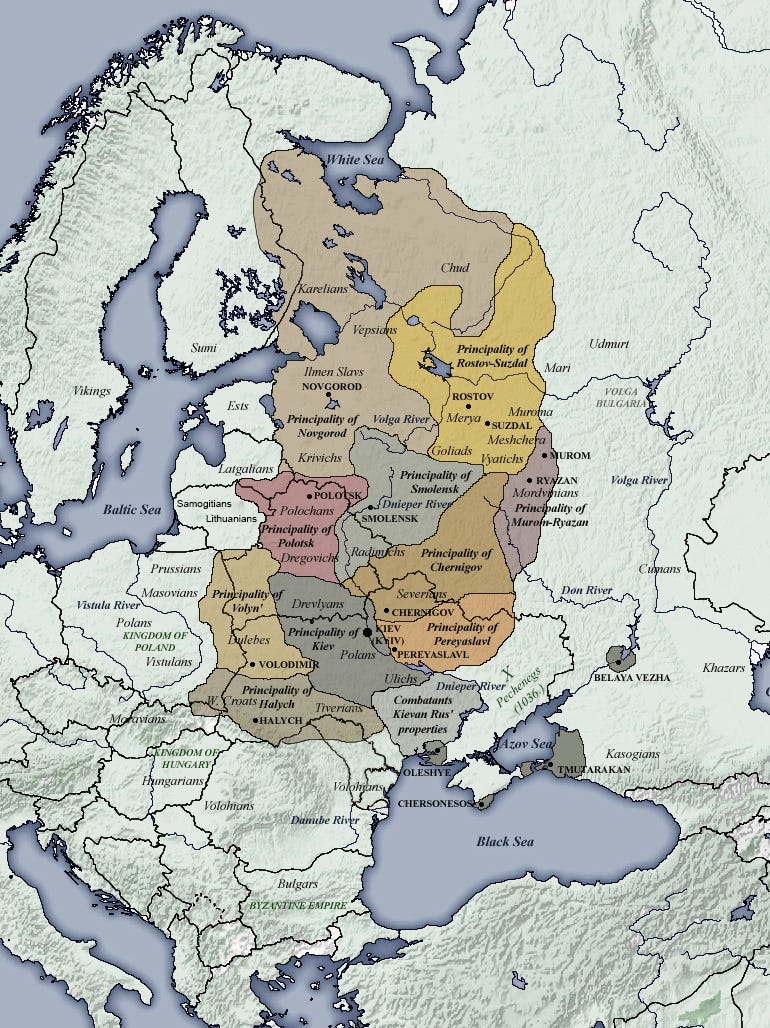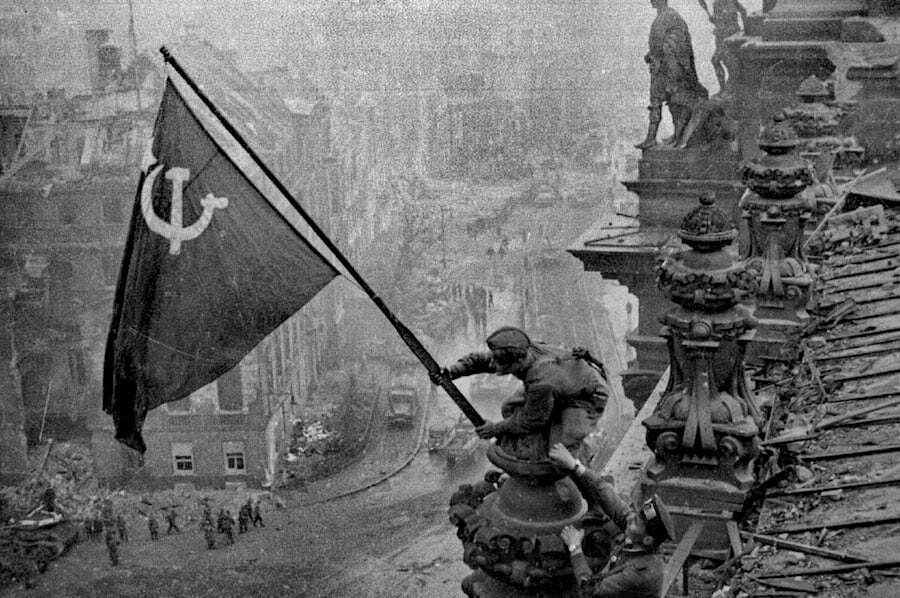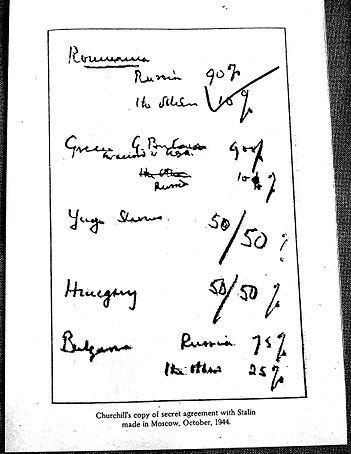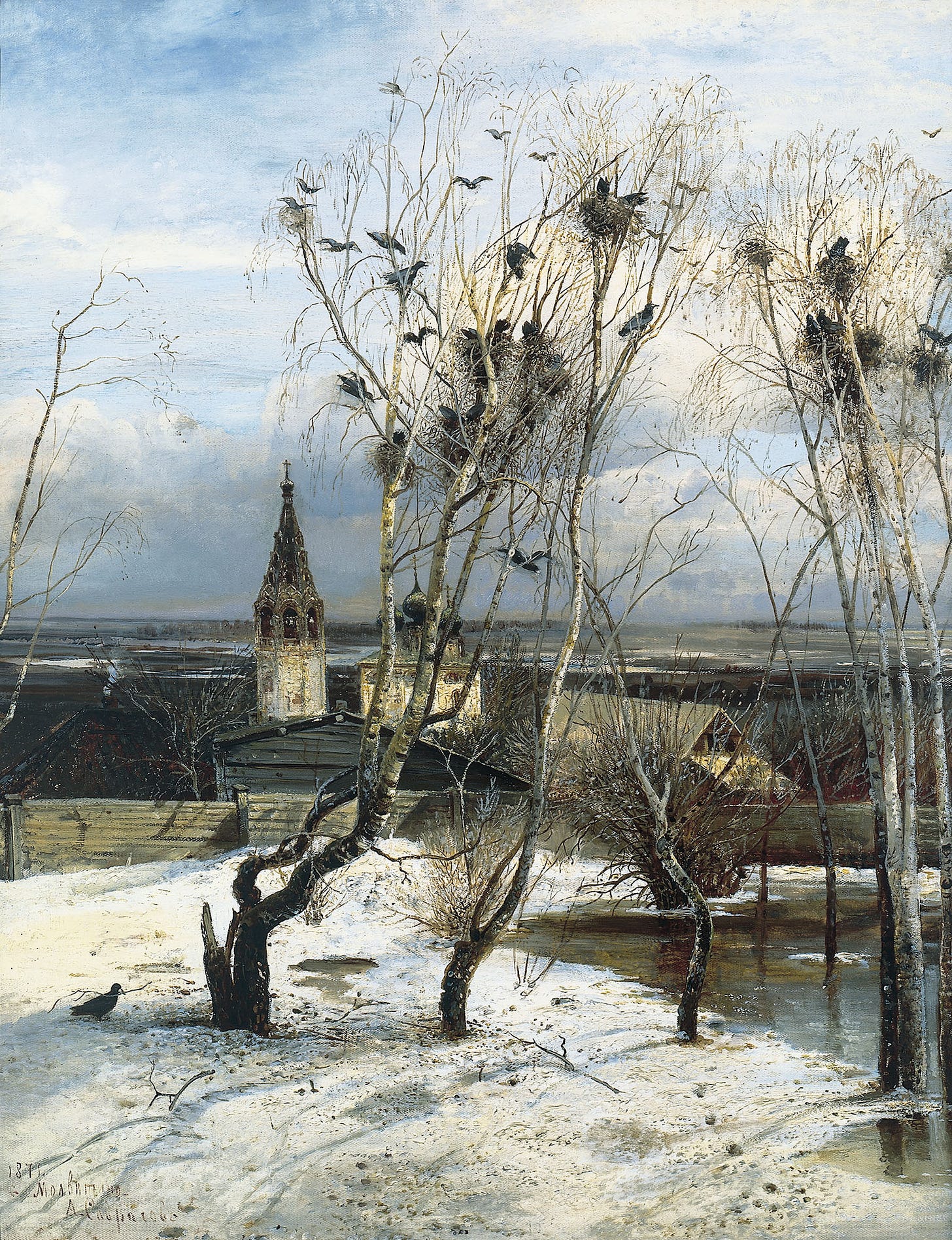
To understand the Russo-Ukraine war that commenced on 24 February 2022, one has to look at Russia’s history to understand how Russians and their rulers think and why they think that way; and also what Europeans think about Russia and why. This is especially important given the mind-boggling propaganda spewed about Russia and the USSR over the past century by the Anglo-American and European powers who continue to seek Russia’s submission.
In short, Russia is the bearer of a civilization both fraternal to and competing with the Western civilization. Thus, one of the eternal dilemmas of the Russian civilization is its relations with the Western civilization - should the two civilizations unite and on what terms?
Unlike the Anglo-Americans, due to its open geography and other factors, throughout its history, Russia has forever been the subject of formidable invasions from all directions. As a result, in order to survive, Russia has developed an intense military-patriotic culture and a justified fixation on national security.
In part due to the invasions, Russia has always been behind its Western brother in terms of scientific and economic development. This backwardness is another perennial issue in Russia, which is always trying to catch up with the West.
The economic superiority of the Western Empire engenders both contempt on the part of Westerners and feelings of inferiority on the part of Russians. Centuries of Western disdain time and again led to the underestimation of Russia’s spirit and military power, and to the disastrous defeats of Western invasions of Russia. Centuries of failing to conquer the “backward” Russians, culminating in World War II, have created a sense of inferiority and revanchism in the European component of Western civilization (i.e. Germany, France, Poland, Sweden, etc.).
Russia’s Past: Overcoming Invasions
The Old (or "Kievan") Rus, a network of cities and principalities in the plains, forests and marshes of northeastern Europe, beyond the borders of the Roman Empire, was formed in and after the 9th century with centers of gravity Novgorod and, especially after the baptism of Saint Vladimir in 988, Kiev. Within the sphere of influence of the Eastern Roman (or Byzantine) Empire, primarily East Slavic, but also bearing a Viking tinge, the Old Rus converted to Orthodox Christianity at the end of the 10th century.
Thus, from its very birth, Russia is similar to but different from the West. The Russian civilization is Slavic with a dominant R1a haplogroup, while the Western one is Frankish with a dominant R1b haplogroup.
Russian civilization was largely outside the boundaries of the Roman Empire, while much of the territory in the West before 1500 had once been subject to Rome.
Catholicism (after 1517 also Protestantism) and Orthodoxy divided the two halves of Greco-Roman ancient civilization, and after 1453, Orthodox Russia inherited the Greek half.
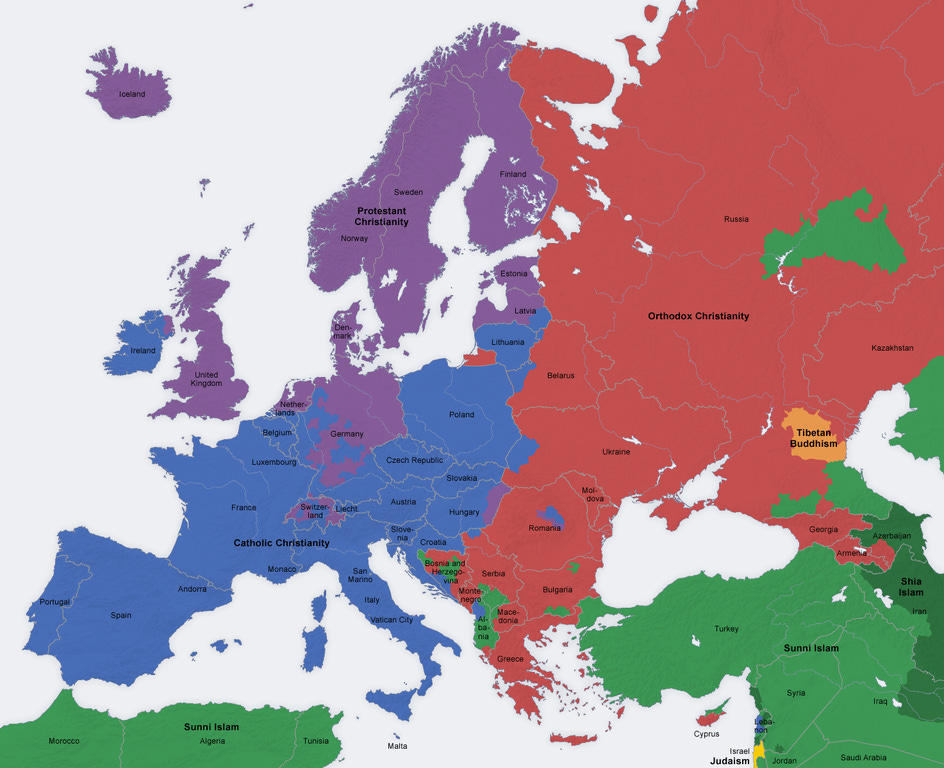
One of the great differences between the development of the Russian and Western empires is that the Ancient Rus had the misfortune to be within reach of the Mongol (or Tatar) hordes, who in the 13th century achieved incredible military feats, slaughtered millions of Eurasians in cold blood, and created one of the greatest empires in history.

Having perfected the art of steppe warfare, the Mongols gave their victims two choices - surrender or die. Cities and armies that refused to surrender were systematically massacred, the victims lined up in front of Mongol warriors who patiently slaughtered them one after another, sometimes for days. Dan Carlin has a great series on the topic.
The Old Rus was simply swept away by the Mongols, cities destroyed, populations massacred. Kiev suffered the sack in 1240. Many territories of modern Russia and especially Ukraine became barren wilderness for centuries. The surviving Russian princes willy-nilly bowed their heads to the Tatars. A yoke that lasted centuries began. Russian princes paid tribute to their Tatar masters; and bade their time.
So when speaking of the backwardness of Russia (and Spain and the Balkans, who bore the brunt of the onslaught of the Moslems), it is worth asking: Where would Western Europe be in under similar circumstances?
Centuries passed, times changed and the Tatars became weaker. In 1380, a Russian force united around Dmitry of Moscow to win a great victory against the Tatars at the Kulikovo Field.

Thus by the 16th century, via wise diplomacy and decisive leadership, Moscow gradually became the center of gravity of the Russian world. In 1547, Ivan the Terrible was crowned Tsar.
The new Russian state created by Ivan the Terrible for more than four centuries suffered incessant invasions from Europe. Virtually every major European power has invaded Russia at one or more times.
At the beginning of the 17th century, famine and strife raged in Russia consequent to a succession crisis. A Time of Troubles (“смута”) had arrived. The Polish-Lithuanian Kingdom - roughly occupying the territories of present-day Poland, Belarus, Ukraine and the Baltic states in the late Middle Ages - used the moment to invade Russia and install a puppet king to the throne - the False Dmitry.
In the period 1610-1612, the Poles controlled Moscow and the Kremlin before getting turfed out by a popular uprising headed by a man called Dryhand.

The Russians lost Smolensk (only 370 km from Moscow) in the peace treaty concluded in 1618. Moscow made an unsuccessful attempt to retake Smolensk in 1632-1634 (the Smolensk War). The second attempt in the period 1654-1667 (Thirteen Years War) succeeded. In addition to Smolensk, the Russian Tsardom regained the Old Russian lands east of the Dnieper, including the old spiritual capital of Kiev. These are the lands where Kharkov, Poltava, Donetsk and Lugansk are today. Polish imperial hopes effectively ended in the 17th century.

In the early 18th century, another great power entered into a long conflict with the Russian Empire: Sweden, ruling at the end of the 17th century most of Scandinavia and parts of Germany and the Baltic States. The Swedish army was one of the best trained and most reputable in Europe.
Sweden's conquests gave rise to territorial claims by Denmark, Poland and Russia, who allied and attacked the Swedes in 1700. The war continued until 1721. The biggest battle of the war was in 1709 near Poltava in present-day Ukraine, between Kiev and Donetsk. The Russian Empire won a decisive victory. The Swedish king and his generals fell captive to the future emperor Peter the Great. The Russians conquered the northern territories and Peter's desired outlet to the Baltic Sea. Determined to secure forever his access to the sea, in 1703 the Tsar founded St. Petersburg on the banks of the Neva. In 1741-1743 and 1788-1790, the Swedes unsuccessfully tried to regain the lost territories. Sweden never recovered its great power status.

Broad-minded, determined, cruel and energetic, Peter the Great traveled through Europe as a youth and was impressed by what he saw. He decided to modernize Russia and did so in a big way, suppressing dissenters' rebellions with bloodshed. Boyars were told to shave and put on western clothes. Russia acquired manufactures and a fleet with the help of Western experts. Marriages with the European nobility took place. The Russian nobility and court spoke French in the 18th and 19th centuries.
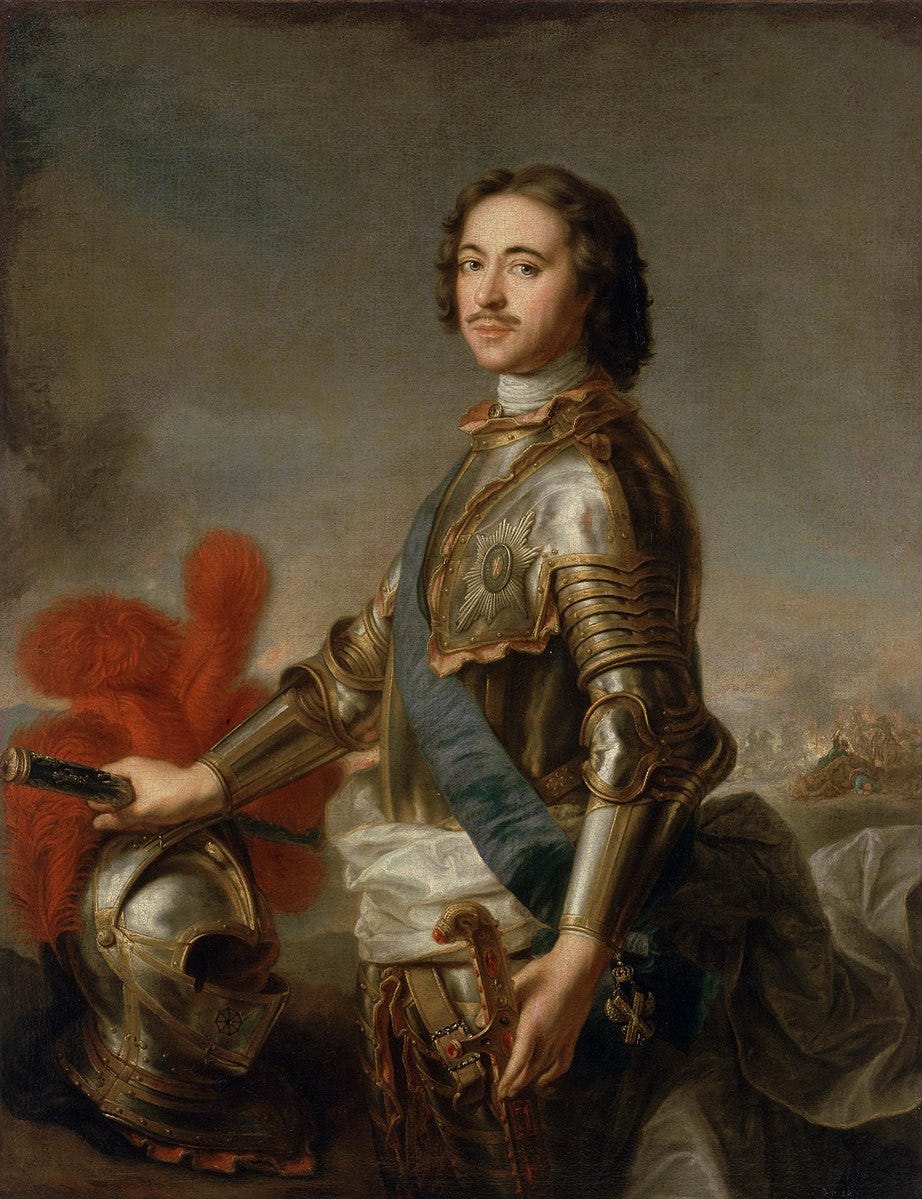
In the late 18th century, Catherine the Great captured Crimea and the fertile but empty (“loca deserta”) lands north of the peninsula (consequently called Novorossiya - New Russia) from the Golden Horde, prominent slave traders and the successors of the former Tatar invaders. Settlers founded Sevastopol, Odessa, Kerch, Kherson, Mariupol, etc.

After conquering all of Europe at the beginning of the 19th century, in 1812 Napoleon Bonaparte invaded Russia at the head of the largest army in European history up to that time, a 450,000-strong army composed mainly of French, but including all sorts of other Europeans.
Well aware of the genius of the Corsican general, the Russian generals led by Kutuzov long refused to give the French a decisive battle. Instead, they trade territory for land. Minsk falls, Smolensk falls. The two armies nevertheless fought at Borodino, 140 kilometers from Moscow. The French won a tactical victory, but failed to destroy the Russian army, which continued its strategic retreat - beyond Moscow.
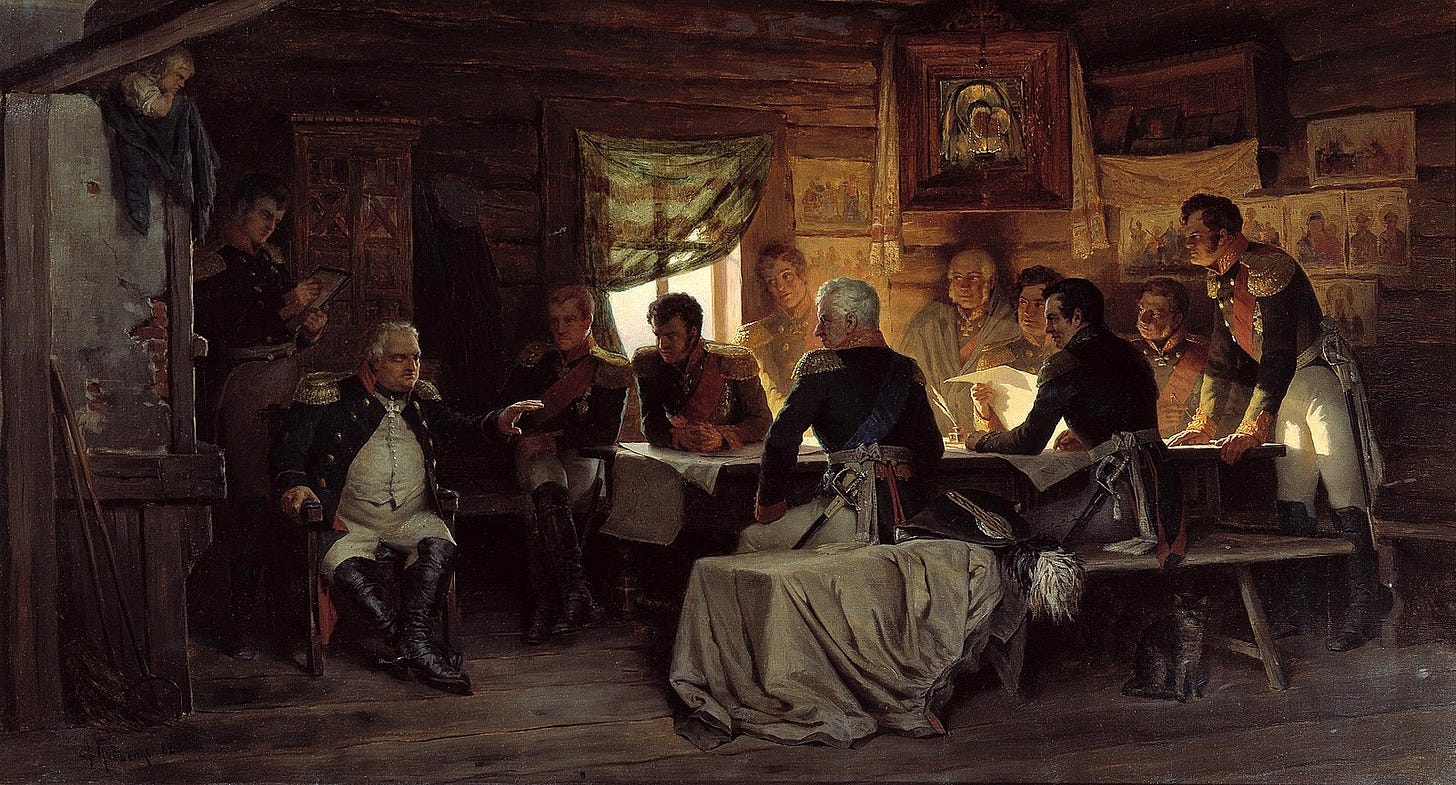
The French Emperor captured the capital on September 14, 1812. Just two days later, three-quarters of the city was reduced to ashes after a fire broke out. Napoleon remained in Moscow for five weeks, but did not receive a capitulation.
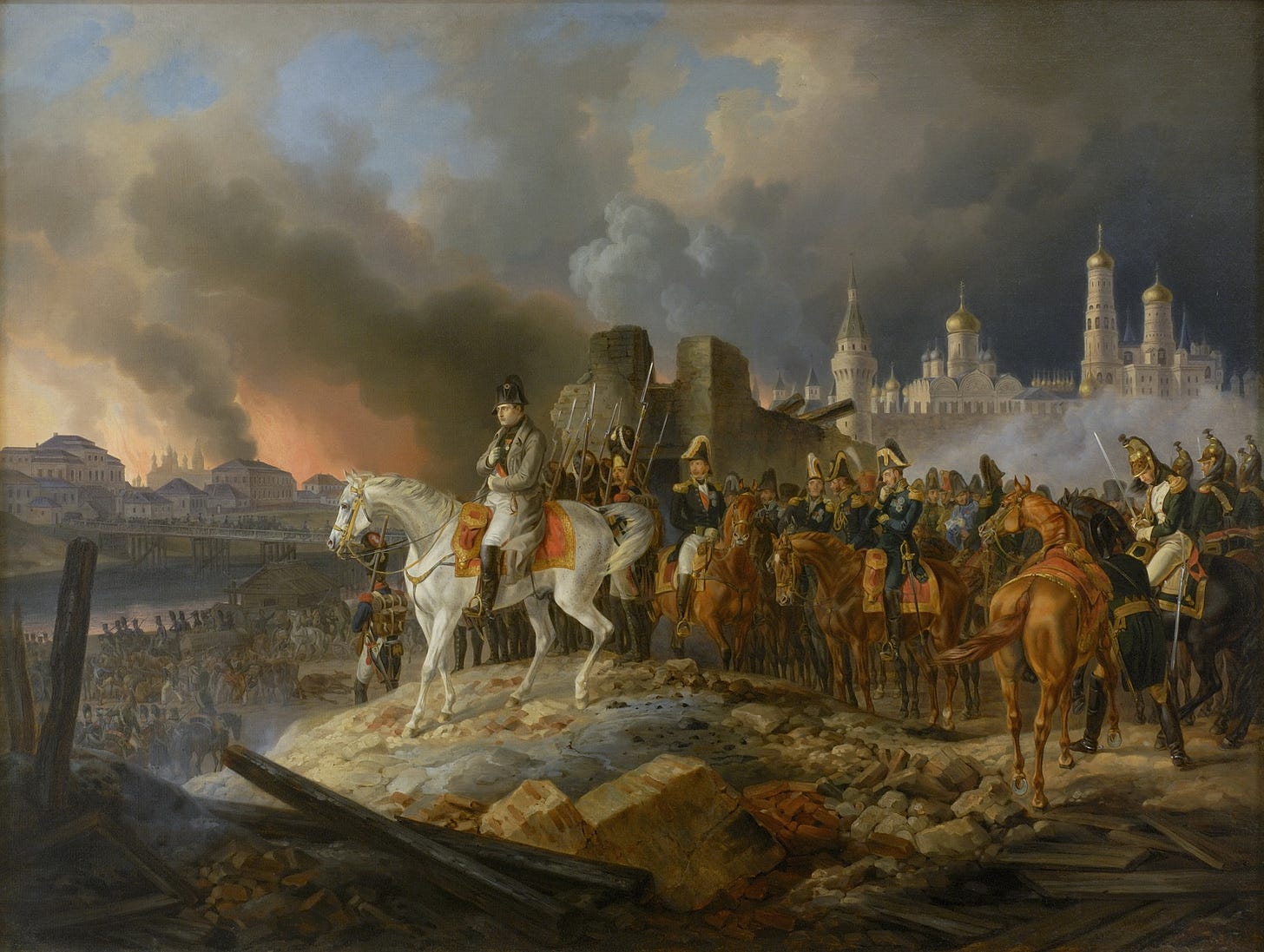
Concerned about his supply lines, Bonaparte headed back west on October 19th. Snow fell and the Russians and Cossack cavalry raided the freezing French throughout the retreat.

Out of a total of 685,000 (with reinforcements) men who invaded Russia in 1812, half of them French, only 70,000 survived. This catastrophic defeat ended a millennium of French exploits on the battlefield. The capitulations of 1870 and 1940 followed, as well as the bitter Pyrrhic victory of 1914-1918. It was not only France that lost. All of continental Europe, united under the iron will of the Little Colonel, suffered a military collapse in the depths of the Russian Empire.

The Russo-French War of 1812, in which Great Britain became the world hegemon, exemplified the grand strategy of the Anglo-Americans in the industrial age - the pitting of Europe united around the power of the day against Russia. Divide et empera.
In 1853, worried about the possibility of Russia capturing Constantinople and the Bosphorus, at the head of a coalition including Piedmont, the Ottoman Empire and France, Britain declared war on Russia and besieged the Russian Black Sea Fleet base at Sevastopol in the Crimea. The Crimean War was on. The Russian Empire, in a period of weakness, lost the war, but with little consequence. Leo Tolstoy was an eyewitness to the events.

Between the 16th and 19th centuries, Russia gradually expanded eastward and settled the endless North Asian tundra and steppe, subduing where necessary the notorious nomadic tribes - the successors of the once mighty Mongols.
Three centuries of Russo-Turkish wars in the Caucasus, Crimea and the Balkans pushed out the Ottoman Islamic Empire and culminated in the Russo-Turkish war of 1877-1878. Atrocities against the Orthodox Christian Bulgarian population after the failure of an uprising in 1876 became a scandal throughout Europe and a major reason for the Russian intervention.

The troops of the Liberator Tsar Alexander II successfully completed the assigned tasks and captured Edirne on January 6, 1878. The other great powers intervened in order to maintain the balance of power. The Russian dream of capturing the ancient Orthodox capital of Constantinople remained unfulfilled.
The Industrial Revolution and the accompanying scientific and technological revolution together with the consequences of the French Revolution fundamentally changed Europe. The telegraph and trains shortened distances. Cities expanded to feed workers into the factories. The school and the mass media appeared in the form of newspapers and magazines. Through schools and the media, ideas of nationalism and the unity of the people and the state spread, putting multi-ethnic empires such as the Russian, Austrian and Ottoman in a difficult position. The problem was compounded by the ideas of liberty, democracy, and republicanism that gained popularity as a result of the French and American Revolutions. The ideas of communism, nihilism, anarchism and natural selection emerged.
The new ideas hit hard the clumsy administration of the already huge, but backward in many respects including the administrative, Russian Empire. Debates of reform raged. One of the deep divisions in Russian society came to fore. The "Westerners" wanted Russia to imitate the Europeans, including at the government level - i.e. they wanted Russia to join the West. Slavophiles, on the other hand, preferred Russia to focus on creating a kind of Slavic civilization. Influential anarchists such as Bakunin and Kropotkin (and eventually even Tolstoy) fought for the elimination of any public authority. Terrorists carried out assassinations, including on the Tsar Liberator Alexander II. A new time of troubles approached.
Something in the 19th century - perhaps the victory in the Patriotic War of 1812 - awakened the literary genius of Russian culture. A dozen world-class writers emerged: Pushkin, Turgenev, Chekhov, Gogol, etc. Two figures rose to the stature of the eternal greats like Shakespeare, Voltaire, Goethe and Dante: Tolstoy and Dostoyevsky.

The Russian Empire came to an end in the early 20th century after two military catastrophes. The first was in 1905, when the newly industrialized Japan made a surprise attack on Russia's Far Eastern territories and then sank its fleet. Then came the First World War of 1914-1918. Three years of bloody fighting left the already stagnant empire, led by the weak Nicholas II, in dire straits.
Here it is worth mentioning the books of the English historian of the second half of the 20th century Antony Sutton (1925-2002). To his great surprise, Sutton discovered that the Bolshevik Revolution received substantial funding from Wall Street (where Trotsky came from in 1917) and London. As is well known, German intelligence also played a role in the events, driving Lenin from Switzerland to Petersburg. Also involved was a mysterious character with unclear loyalties - Parvus.
Hardly anyone expected the events that followed; but in any case, the attempt to weaken Russia proved effective. A revolution broke out and the bloody Civil War commenced. The Bolsheviks saw themselves forced into the infamous Treaty of Brest-Litovsk, which gave vast territories to the Central Powers and created a German protectorate in Poland.

When the Central Powers surrendered in late 1918, the newly hatched second Polish state invaded the western Russian lands for the purpose of conquest. The war lasted for three years and ended in 1921. Exhausted after long years of war, both sides remained dissatisfied. The Bolsheviks wished to reclaim territories that belonged to the Russian Empire; Lenin and Trotsky dreamt of world revolution. Poles dreamt of a second Polish Empire.
In fact, few nations in Europe were happy after the Versailles Peace Treaty of 1919. The great multi-ethnic empires fell apart. The impossibility of matching the borders of states with the complicated ethnic map of Europe created tension across the continent. Moreover, in order to instill patriotism, the newly created school systems and mass media inculcated chauvinism far and wide. Every nation aspired toward greatness, of reaching again the borders of the former golden age, or at least of regaining the territories inhabited by their own ethnic populations.
In the Anglo-speaking world there is a thesis, supported by facts and documents, that the Anglo-Americans financed Hitler in the interwar period to re-implement the “let’s you and him fight” scheme. Details can be found in Quigley's Tragedy and Hope (1966), Anthony Sutton's Wall Street and the Rise of Hitler (1976) and Guido Giacomo Preparata's Conjuring Hitler (2005).
The Great Depression and the Spanish Civil War finally provoked the explosion of the pent up vengeful energies in Europe once more. In September 1939, the panzers moved towards Warsaw. Within a few months, Germany, with minimal help from Italy, subjugated almost all of Europe to its will.
The Iberians, the Swedes and the Swiss remain independent. Meanwhile, the Stalinist USSR regains the territories that belonged to the Russian Empire - the Baltic States, then eastern Poland including (Eastern) Galicia and a buffer zone between Leningrad and Finland.
Then came the fateful day of June 22, 1941, when a 4-million-strong German-led European army invaded the Soviet Union. In addition to millions of German soldiers, this army contained hundreds of thousands of soldiers in Italian, Romanian and Hungarian divisions, as well as battalions of volunteers from all over Europe.

Despite receiving warnings, Stalin was taken completely by surprise and was in shock for a fortnight. Mauled by the battle-hardened Wehrmacht, The Red Army suffered catastrophic losses. By December, Leningrad was under siege, Kiev and Smolensk fell with hundreds of thousands of soldiers captured, the Ukrainian SSR was almost entirely under German control, and German tankmen could see the Kremlin towers through their binoculars. Exhausted from the fighting, shivering with cold, and facing heavy counterattacks from newly arrived Far Eastern troops, the Germans halted their advance.

In 1942, the focus moved to the southern front. Sevastopol fell following a heroic defense. Maneuvers and battles raged around Kharkov. In the summer, the new German offensive began. The target was the Soviet oil springing up around Baku and reaching the Red Army along the Volga River, at the mouth of which Volgograd, called Stalingrad at the time, rests.

The Wehrmacht's Sixth Army reached Stalingrad, but failed to capture it and was surrounded at the end of the year. Attempts to resupply by air failed and hundreds of thousands of German, Italian and Romanian soldiers were killed or captured in early 1943. The Battle of Stalingrad was the largest in history with over 2 million soldiers involved.
In the spring of 1943, Germany and the USSR alternated attacks and counter-attacks, and Kharkov changed hands again. The front stabilized on the territory of today's eastern Ukraine and southern Russia. The final push of the German war machine crashed into the Soviet fortifications around Kursk in the summer of 1943 in the largest tank battle in history.
The liberation of Europe followed after two more years of heavy fighting and countless casualties. In the battle for Berlin alone, 80,000 Red Army soldiers fell in battle and more than 200,000 were wounded.
After three years of savage carnage on their own land against an enemy expressly invading to obtain "lebensraum" (i.e. land for settlement), the Soviet losses were incalculable . Maybe 20 million people, maybe 30. All of European Russia was a ruin.
In the summer of 1945, as agreed, the USSR joined the war against Japan. After the war, the USSR received the Kuril Islands, which Japan wants to get back to this day.
Towards the end of the war, Stalin and Churchill informally discussed the division of Europe between the USSR and the Anglo-Americans in the so-called "percentages agreement".
Official negotiations and agreements followed in Yalta and Potsdam. Germany, accused of starting the war, was split in two so that it could never again threaten the peace of Europe. Eager to create a buffer between itself and potential aggressors in the West, the USSR reclaimed the borders of the Russian Empire, took the (Old Russian) province of Galicia from Poland and gave Poland a slice of East Germany. Most of Eastern Europe fell within the Soviet sphere of influence; the exception was the traditional British ally Greece, where, in accordance with the "percentages agreement", Stalin refused support to the highly developed Greek communist partisan movement and left the Greek communists to be destroyed by the British-backed junta. Of course, for its part, Moscow installed communist regimes in Poland, Czechoslovakia, and Hungary.
In the post-war era, the inspired Soviet state set about rebuilding, and then developing, war-torn Eastern Europe. Across Eastern Europe, the results are still evident. Whole neighborhoods built on a grand scale; a highly developed electricity network including nuclear power plants and hydroelectric power plants; and, before 1991, light and heavy industry, agriculture, science and education, etc.
The USSR achieved results in the high-tech sphere as well. Astronauts flew through the skies and nuclear missiles provided insurance against future invasions.
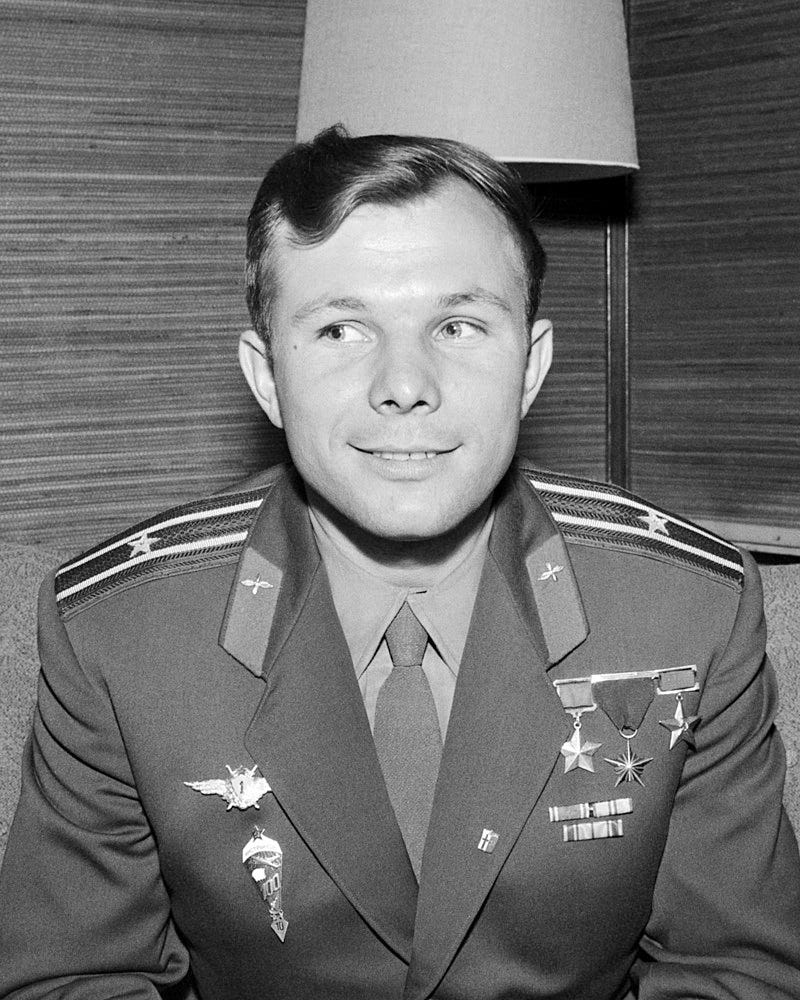
An incredible amount was achieved compared to where things stood in 1878 or 1945. But existing fissures deepened. One such was the buffer formalized via the Warsaw Pact. Although Slavic, Poland and the Czech Republic are Catholic countries that have not experienced the Tatar or Ottoman yokes. And Hungary is not even Slavic. As a result, even under favorable circumstances, these three countries would hardly accept Russian dominion. And the circumstances for the USSR during the Cold War were unfavorable. Powerful Anglo-American propaganda, backed by the wealth and sex-appeal of the undeniably beautiful, free, and untouched by war America of the 1950s, further stirred spirits in Eastern Europe. The anti-human atheism dictated by the dogmas of communism gave rise to natural and fully justified resistance. The destabilizing riots in Hungary in 1956, in the Czech Republic in 1968, and in Poland in 1980 ("Solidarity") were the natural result.
Problems arose within the communist system, whose foundations were somewhat utopian. In both the West and the East, the generation that won the war raised its children and retired. Born in a time of peace and development, post-war children desire the epicurean good life - concerts, cinema, consumer goods, travel, etc. And these things were more accessible in the liberal and materially developed West, where America and Great Britain remained physically almost unaffected by the war, and even France suffered far less than Poland or the USSR. Also attractive were the traditional American freedoms of speech and religion, two basic human needs restricted in the USSR.
At the end, after 70 years of communism, for one reason or another, the Soviet nomenclature lost faith in itself and its system and de facto surrendered to the Western Empire with the intention of accepting its norms and perhaps even becoming part of it. The Warsaw Pact collapsed in 1989; and in 1991 the Soviet Union agreed to peacefully dissolve.
The Lessons of Russia’s History
What conclusions can we draw from this summary? First, Russia's history is a series of successfully repelled invasions, many of them coming from its sister and neighboring Western civilization. Repulsed, but at a colossal price - especially after the Second World War, which is special in that for the first time the goal was not even enslavement, but the complete physical destruction of the Russian people and civilization. The hard-fought victories of 1812 and 1945 became deeply embedded in the Russian self-consciousness. After the collapse of the USSR, Victory over the Nazis Day, May 9, became the main national holiday. As a result of the many defensive wars, national security is the main priority of every Russian state. And the main instruments of security are space, a strong and well-armed army and a people ready to make sacrifices.

In this respect, it is worth comparing the Anglo-Americans with the Russians. The English state has not fought on its own soil since 1066. That is a millennium of fighting abroad. The Americans have fought on their soil only once - in 1812, when the British burned Washington. (Pearl Harbor was deep in the Pacific Ocean and the battle there was on sea and air; i.e. it was not an invasion.) Hidden behind their trenches, the Anglo-Americans have attacked virtually the entire world. The English have been in over 190 of the current countries and the Americans in over 70.
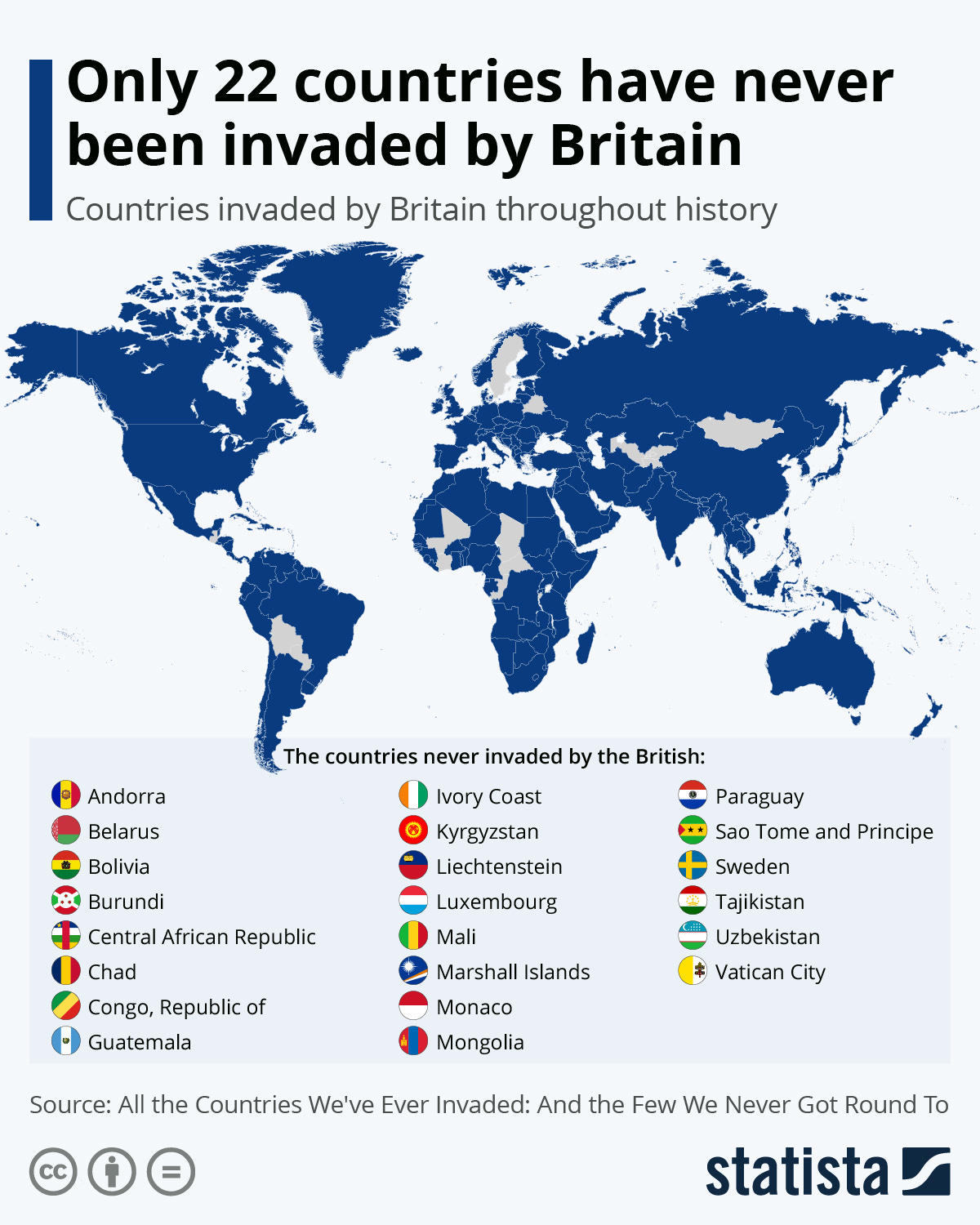
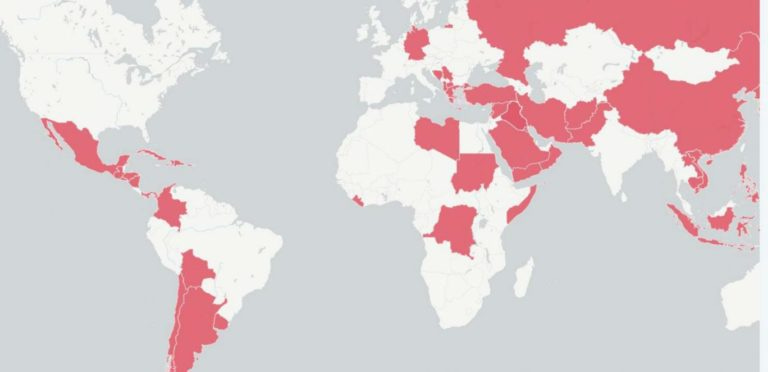
Its own land is of utmost importance to Russia. Because seas of blood have been shed for every span and because, as the two “patriotic” wars (1812 and 1941) show, the land itself is one of the strongest defensive weapons of the Russians, and every generation must defend this land anew.
The idea that the Russians are some kind of an imperialist bloodthirsty barbaric horde threatening Europe is historically unfounded and is a psychological projection on the part of the Western Europeans who have tried and failed to enslave the Russians for centuries. The hypocrisy is particularly glaring on the part of the Anglo-Americans, who for three centuries have engaged in frank attempts to dominate the entire world.
Are the Russians angels? No. Are they in any way worse than their Western cousins? No.
Another conclusion we can draw is that practically all of Western Europe, has the prerequisites to feel passionate contempt, envy and revanchism towards Russia.
Contempt, because the Russians have for a long time been poorer and more backward than their cousins.
Envy, because almost a century after Europe surrendered most of its sovereignty to the Anglo-Americans, Russia remains independent.
Revanchism, because the dreams of world or at least regional domination of every major European country - France, Germany, Sweden, Poland, Italy - died ingloriously in the depths of the Russian steppes. This Revanchism has mixed with fear of potential future such defeats. The subservience of the Europeans to the Anglo-Americans is largely due to the outcome of the Second World War. Europe learned from the events of 1812 and 1945 that it alone cannot subdue Russia. But many hope that together with the Anglo-Americans, they can accomplish what Napoleon and Hitler could not.
The attitude of the Anglo-Americans toward Russia is different. As insular peoples, the Anglo-Americans have almost never had to fight on their own soil. They always fight abroad and with relatively limited forces. Thus, unlike the Germans, the French, and the Russians, the Anglo-Americans do not know what it means to see razed to the ground whole areas of your country and to lose millions of their countrymen. This makes them particularly arrogant and condescending. For Anglo-Americans, Russia is a pesky rival who should simply stop resisting and accept legitimate Anglo-American dominance. And even more so after the collapse of the USSR.
It is important to note here that the psychological dynamics described above are the result of the historical and ideological developments of the last two or three centuries and are subject to change. State-forming factors change from era to era along with weapon technology and ideological fads. Carroll Quigley has an interesting (unpublished) tome on the subject - Weapon Systems and Political Stability.
As the Chinese say, what is whole will fall apart and what is divided will come together again. Modern states, especially in Europe, are the product of the mass armies and nationalism of the 19th and first half of the 20th century. On the one hand, modern armies are expensive to equip and train, and modern means of mass communication are highly concentrated in a handful of hands. This allows the existence of, for example, the Anglo-American Empire, which is able to bomb almost every corner of the planet with impunity and directly manipulate the minds of billions of people through Facebook, Twitter and television. On the other hand, even a small country can secure its sovereignty by holding the whole world hostage with an arsenal of two to three hundred nuclear warheads mounted on supersonic missiles.
As for the Russian attitude towards the West, it goes in fads. In the last 30 years we have witnessed a sincere and distinct attempt at "westernization". The ever-existing "Smerdyakovtsi" (i.e. self-hating Russians; Smerdyakov is a character in Dostoyevsky’s The Brothers Karamazov) for a while (especially in the 90s) took over.
But it turned out that the Russians misunderstood the intentions of the Anglo-American Empire. Russia wanted capitalism, democracy and freedom - but with a Russian character and adapted to the Russian people and state. Russian culture and sovereignty have lived through too much to submit without a fight. And the Anglo-Americans actually only want Russian sovereignty. All the democracies and freedoms are irrelevant. After all, Saudi Arabia, a far cry from the vaunted Western values, is an old and faithful ally of the Anglo-Americans. The important thing for London and Washington is that the Russians be subdued.
But Russia remains a tough nut to crack. She is adamant and has proven it time and time again. She only fell once, to the terrible Tatars; but rose again, stronger.





